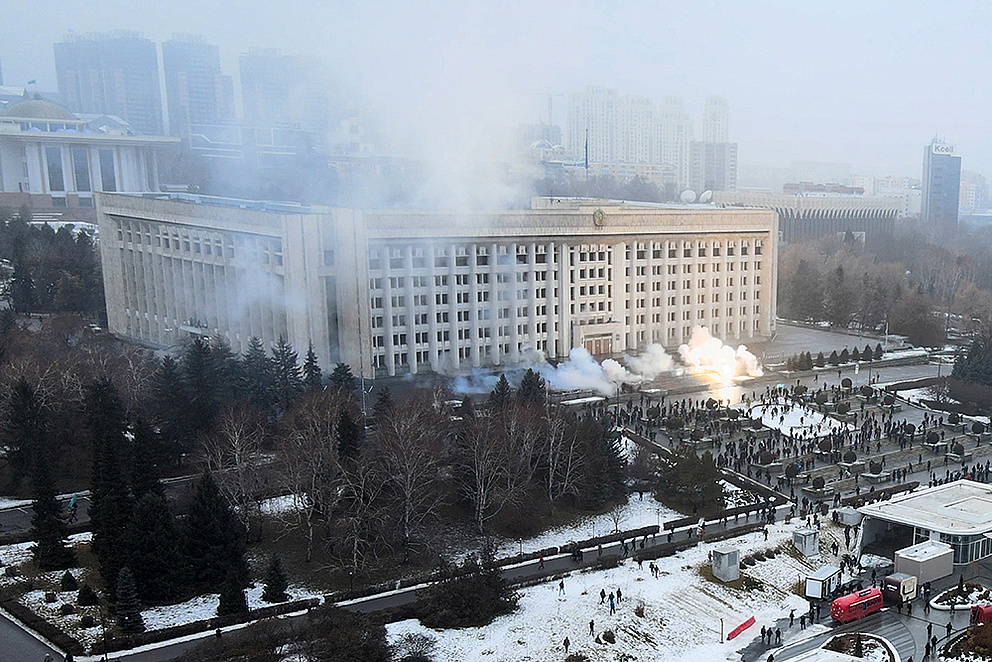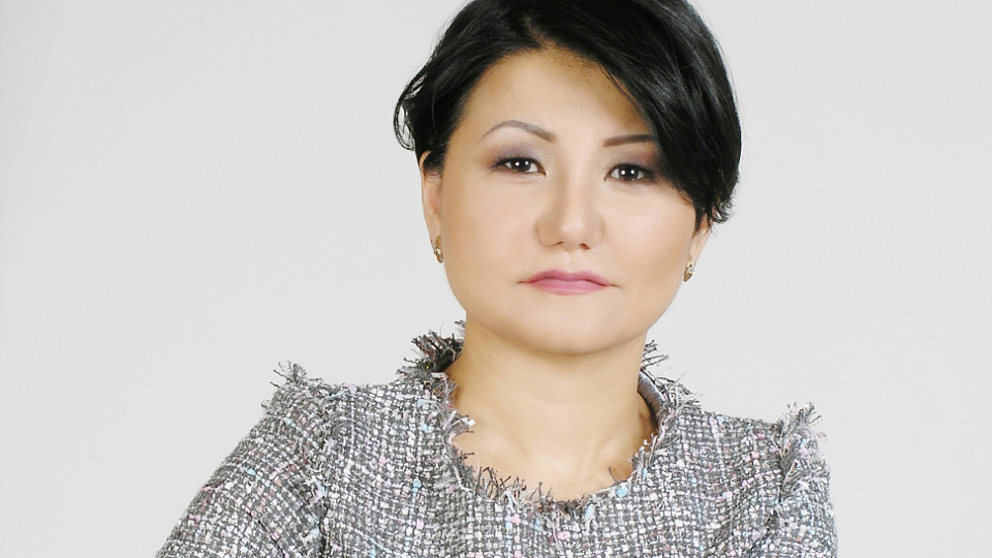

Contact
Press, Communications and Marketing
Tel.: +49 228 833-144
Fax: +49 228 833-441
presse[at]avh.de
Demonstrators took to the streets in Kazakhstan in early 2022, initially to protest surging fuel prices. On 5 January, government buildings, banks, cars and businesses in several cities were set on fire or plundered. President Tokayev cracked down on the protesters and issued a shoot-to-kill order. Ultimately, he called upon the Collective Security Treaty Organization (CSTO) to send troops from Russia, Belarus, Armenia, Tajikistan and Kyrgyzstan to Kazakhstan. They have been withdrawn in the meantime. The Republic of Kazakhstan declared its independence in 1991. Nursultan Nazarbayev served as president until 2019, but even after leaving office he continued to be considered the most powerful man in the country. He was succeeded by Kassym-Jomart Tokayev.
Ms. Umbetalijeva, we read about the many deaths and the thousands of people who were arrested. How are you experiencing the situation in Kazakhstan at the moment?
Tolganay Umbetalijeva: Based on President Tokayev’s statement that Kazakhstan’s largest city, Almaty, was attacked by around 20,000 people, it is likely that the number of people arrested will increase further throughout the country (according to reports, their number has since risen to 12,000, ZEIT online 12.1.22; the authorities report that 225 people have died and more than 4,300 have been injured, as of 15.1.22). Although the authorities have said that people taking part in peaceful demonstrations will be not arrested or punished, there have been reports of arrests in other cities.
The situation in Almaty and other cities has since stabilised. Public transportation has begun operating again and the food supply situation has improved. Of course, there are still checkpoints on roads leading into and out of cities and the state of emergency will be in place until 19 January. But the people living in Almaty are shaking off the shock and are starting to discuss what they themselves saw and experienced.
You work for the Central Asian Foundation for the Development of Democracy. Have any restrictions been placed on the foundation’s work?
I am the director of the Central Asian Foundation for the Development of Democracy, but am currently on maternity leave. We do research projects and have conducted a number of sociological studies in Kazakhstan regarding political topics. The government did not place any serious obstacles in our way during the time before my maternity leave. I can remember only one time when the security services attempted to exert their influence – that was in connection with the events in the city of Zhanaozen in West Kazakhstan Region (Editor’s note: In December 2011, following protests by workers in the oil and gas industry, there were violent clashes between demonstrators and the police which left several dead and injured around 100. The “Zhanaozen massacre” during President Nursultan Nazarbayev’s term of office is said to be the first violent crackdown on demonstrations since Kazakhstan’s independence in 1991).
However, human rights organisations are unfortunately regularly subjected to financial audits by government bodies. In the wake of the “colour revolutions” (unarmed, usually peaceful but not always non-violent regime changes in the early 2000s, such as in Ukraine and Kyrgyzstan), the government became wary of NGOs. The most active NGOs were policed and had to temporarily suspend their activities.

Dr. Tolganay Umbetalijeva
The political scientist Dr Tolganay Umbetalijeva was a guest at the Institute for Asian and African Studies of Humboldt-Universität zu Berlin and at European University Viadrina in Frankfurt (Oder) in 2006 and 2007 through a Georg Forster Research Fellowship from the Humboldt Foundation. She returned to Germany again in 2015 for a research stay at the Research Centre for East European Studies at the University of Bremen. She is director of the Central Asian Foundation for the Development of Democracy in Almaty, Kazakhstan, and a member of the Board of Trustees of the Central Asia Institute for Strategic Studies (CAISS).

What do the disturbances mean for the development of democracy in your country?
Looking at Kazakhstan’s history as an independent state, we can now say there have been two major uprisings – the one in the city of Zhanaozen in 2011 and the current “tragedy of Almaty”. In my opinion, both have contributed to embedding the idea of democracy in the general population: During the 1990s, the political authorities paid little attention to the activities of their adversaries in the civilian population, and did not view them as serious opponents. In the 2000s however – after several “colour revolutions” in the post-Soviet area – the government revised its relationship with critics. It began to view each protest as a threat. In the process, the events in Zhanaozen became a pivotal moment. They didn’t lead to a change in the political regime, but they fostered the development of democratic values in society, and the desire for democratic transformation and participation. People thought about the concept of democracy and ways to fight for their rights in a new light.
Do you still have contact with your Humboldt host institutions?
Yes, I do. I’m in constant contact with colleagues from Germany, and particularly with colleagues from Humboldt-Universität zu Berlin and the University of Bremen. I was pleased to receive letters and calls from colleagues from Germany in recent weeks. They were concerned and asked if everything was okay. They have my heartfelt thanks for this.
What does the unrest mean for international cooperation?
On the one hand, such situations like the current unrest give rise to new projects because conflicts call for a science-driven description, reflection and analysis. So they definitely set collaboration in motion. On the other hand, however, they also hamper the realisation of workshops, conferences and field studies.
The unrest was initially described as spontaneous actions to protest higher fuel prices. According to German media, President Tokayev said it was an attempt to overthrow the government with groups of armed combatants. Former president Nazarbayev is said to be accused of high treason. His whereabouts were unclear. Is it possible that different conflicts are being thrown together here?
You’re right. We’re talking about several different conflicts. The first conflict involves the deterioration of the population’s social situation – an increase in social inequity that triggers dissatisfaction. The second conflict is the internal power struggle between members of the family of former president Nazarbayev and the current president Tokayev. The third conflict is the relationship between religious forces (some members of the Nazarbayev family have ties to Islamic religious movements) and government bodies. Within this chaos you can also see problems in the relationship between political authorities and security services. In light of this, President Tokayev requested help from the CSTO.
What do you hope for the future?
We naturally hope for political reforms in the future. I’m concerned that the unresolved political problems might trigger another wave in this power struggle, given that the affair surrounding “Jelbasy” (the “leader of the nation”) Nursultan Nazarbayev and members of his family remains unclarified. Where are they right now? And if members of the family of the first president were really behind the coup attempts, what kind of effect would this have on the political system? Will the struggle for power in the country continue? There are still a lot of questions to be answered.
